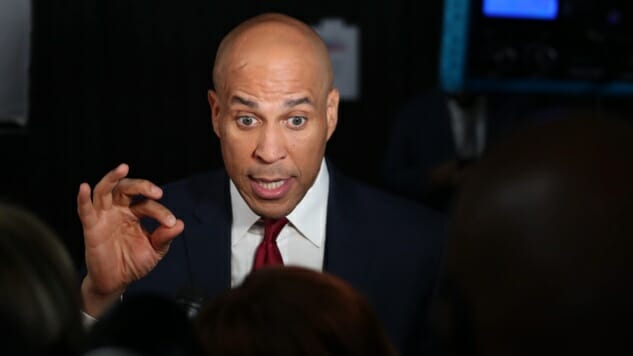The Hellish “Gotcha” Debates Stumble On
Photo by Joe Raedle/Getty
There was a remarkable moment in Wednesday’s Democratic primary debate, and it happened so quickly that if you blinked, you’d miss it: Ashley Parker, an actual reporter for the Washington Post who had been deputized as MSNBC-moderator-for-a-night (one of a cadre that qualifies as the best ever, if you buy into Brian Williams’ post-debate superlatives, which…be careful), was addressing Elizabeth Warren on the topic of Trump’s wall, and chose to frame her question like so:
PARKER: Senator Warren, back to you. You’ve said that the border wall that President Trump has proposed is, quote, “a monument to hate and division.” Would you ask taxpayers to pay to take down any part of the wall on the nation’s southern border?
I sat there, gobsmacked, as I considered the implications of this question. I was expecting the usual absurdist framing from the moderators, designed to bolster centrist candidates—you know the old standbys by now, from “Do you want to give the sons and daughters of rich people free college education and/or debt relief?” to “Do you want to kick 160 million Americans off their beloved private insurance?” But this was truly a step beyond. Near as I could tell, Parker was taking the prospect of Trump’s wasteful, racist wall, putting the financial responsibility for its hypothetical future destruction on Warren, and literally accusing her by implication of taking Americans’ money for a rabid ideological mission to erase the last vestiges of Trump’s influence.
It takes, I have to say, a truly broken brain to devise this question. It involves skipping right past the monstrosity of the wall itself and somehow putting the blame on Elizabeth Warren (by extending the argument into a future that does not currently seem at all likely to transpire), who hasn’t been particularly outspoken about the wall in relation to the other candidates on stage, and who, as far as I can tell, has never mentioned bulldozing a structure that has not yet been erected!
What do you possibly say to this? How can you possibly evaluate a televised spectacle that includes an exchange of this sort? What can you think about a moderator who would ask this, and isn’t even on MSNBC’s regular roster of Russia paranoiacs?
If you’re Warren, you brush it aside as quickly as possible in an attempt to move the conversation to something—anything—substantial:
WARREN: If there are parts of the wall that are not useful in our defense, of course we should do it. The real point here is that we need to stop this manmade crisis at the border.
But Parker’s question, like Trump himself, was not a puzzling one-off; it was a symptom of a much larger problem, which is that the moderators at this year’s debates, along with many of the candidates, seem to view it as their job to attack any candidate not named Pete Buttigieg, Joe Biden, or Kamala Harris with cutting questions designed to sow doubt and even insult the candidate in the asking. And if they were just “tough questions,” that would be fine, but almost every time they are based on smokescreen logic like Parker’s example above. As mentioned earlier, the stupidity of asking leftist candidates about “kicking 160 million people off their health insurance” has become so normal as to be a debate ritual at this point, despite the fact that it’s deliberately misleading and anyone with a brain knows it: a Medicare-for-all system covers everyone, bar none, making private insurance (mostly) redundant. Nobody would lose insurance, but the question seeks to imply exactly that. It’s the same with the “rich people’s children!” scare tactic when it comes to student debt or free tuition at public colleges; something that would be massively helpful to millions of people is attacked with a financially irrelevant side effect in an attempt to smear it with bad optics.
And all of this comes from an allegedly left-wing press!
The candidates, or at least most of them, have learned the lesson, and true to form they spent most of the debate attempting to score a zinger or reciting pre-written speeches. One of the funniest things I saw all night came in the introduction to an otherwise moving statement by Cory Booker about John Lewis, one of the most inspiring men in America’s history who fought at great personal cost during the civil rights movement. Here’s how Booker started that closing statement:
I had a closing statement prepared, but I saw in the audience during the break a man named John Lewis. And perhaps it’s interesting and important for me to mention why I’m so grateful to him.
-

-

-

-

-

-

-

-

-

-

-

-

-

-

-

-

-

-

-

-

-

-

-

-

-

-

-

-

-

-

-

-

-

-

-

-

-

-

-

-








































